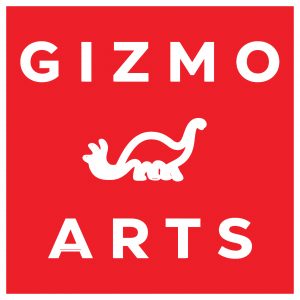The Mobile Abolition Library at SITE SANTA FE

Saturday, September 7, 2024
10am-1pm
SITE SANTA FE
Celebrate New Public Artwork by Cassils
Join us at SITE SANTA FE for the public launch of the Etched in Light Billboard Project, by artist Cassils. In anticipation of Cassils’ upcoming exhibition, Movements, SITE SANTA FE is hosting a celebratory morning honoring the unveiling of the new Billboard Project.
During the Billboard launch, we will screen a short video about the Etched in Light project, followed by an informal Q&A with Curator Brandee Caoba and Director of Creativity Matthew Contos about the upcoming exhibition and public programs.
The Billboard launch celebration will be accompanied by The Mobile Abolition Library, a visual arts and literacy initiative grounded in an abolitionist framework that takes the form of a library on wheels. The library houses a collection of over 300 books, zines, a seed library, and a portrait archive. The materials in the collection cover topics related to abolition, social justice, and community care. The library emphasizes grassroots and alternative methods to reimagine the possibility of transforming criminal justice to envision and create a more equitable and sustainable future.
We will also be joined by Noise for Now, a national initiative that enables artists and entertainers to connect with and financially support grassroots organizations that work in the field of reproductive justice, including abortion access. Noise for Now has worked with over 450 artists and entertainers to raise $1.37 million for 50 reproductive health, rights, and justice organizations across the U.S.
Etched in Light Billboard Project is part of Movements, Cassils’ solo exhibition, on view from November 15, 2024, through February 3, 2025.
Etched In Light channels the affective energies of lie-ins, die-ins, and the historic NAMES Project AIDS Memorial Quilt. These billboards embody the presence of trans* and non-binary bodies, capturing moments of intimacy, resilience, and tender connection. The billboards represent details from Cassils’s large-scale cyanotypes, which were created with the National Center for Transgender Equality and over 100 trans* artists at the National Mall in Washington, D.C., on Transgender Day of Visibility, March 31, 2024. Performers were invited to lie upon a 15 x 60-foot canvas coated in a photographic solution for 25 minutes, allowing the sun to register their exposure and water to develop a massive camera-free photographic print that emerged in real-time. The collective body compositions interpret the themes of self-actualization and empowerment against an antagonistic political backdrop where trans* people face severe discrimination, stigma, and systemic inequality. This work continues Cassils’s engagement with questions of trans* visibility: exploring abstraction as a tactic that refuses the surveilling and voyeuristic gaze leveled at trans* bodies. Simultaneously, Etched In Light creates a powerful testament to LBGTQIA+’s history, endurance, presence, and active resistance.
The Mobile Abolition Library is a visual arts and literacy initiative grounded in an abolitionist framework. The mobile collection and its programming is centered in challenging and reimagining the systems of surveillance, policing, punishment, and community care. The intention is to be a community-driven project that raises awareness, inspires critical thinking, and fosters discussions about incarceration’s impact on communities. The project is a collaboration between Bernadine Hernandez and Martìn Wannam of the Fronteristxs collective and sheri crider of the Sanitary Tortilla Factory. Additional contributing artists include Delilah Montoya, John-Mark Collins, and Kaitlin Bryson.
Noise for Now is a national initiative that enables artists and entertainers to connect with and financially support grassroots organizations that work in the field of Reproductive Justice, including abortion access. Reproductive health care services, including access to legal abortion, are under attack. By organizing benefit events and campaigns, NOISE FOR NOW provides opportunities for artists and entertainers to use their talent to raise money and send a clear message that Reproductive Rights are human rights. Since the first NOISE FOR NOW benefit concert at the Santa Fe Opera in 2017, NOISE FOR NOW has worked with over 450 artists and entertainers to raise $1.37 million for 50 Reproductive Health, Rights and Justice organizations across the U.S.
SITE SANTA FE’s Billboard Project is a series of artist-led billboards and activations introducing art and dialogue into public space.
This program is supported in part by the Western States Arts Federation (WESTAF) and the National Endowment for the Arts.

Material Connection
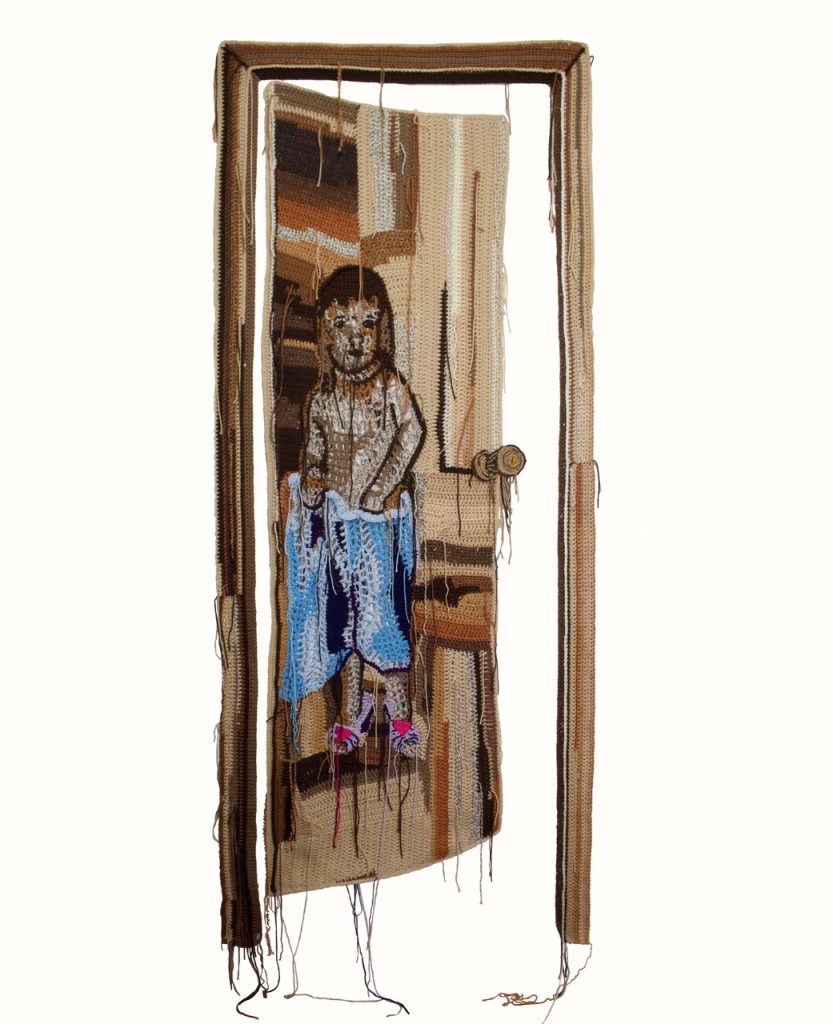
Baylee Schmitt, Door 1, Crochet Tapestry Yarn, 2024
Material Connection
Audrey An, Twiggy Boden, Baylee Schmitt, Christopher Williams, Emily Wright
August 2 – September 13, 2024
Opening Reception: Friday August 2, 5-8pm
Sanitary Tortilla Factory is pleased to present Material Connection, a group exhibition curated by Emily Wright. Material Connection brings together emerging artists from across the country who use a variety of mediums to weave connections between materials and icons, telling personal stories. Using accessible materials such as clay, yarn, and paper, they find a balance between the easily recognizable and the unfamiliar. From Audrey An’s careful perfectionism to the quick and intuitive building style of Christopher Williams, the character of their stories is reflected in their handling of materials.
As these artists re-write their own stories and examine the narratives told about them through
their material handling and storytelling, they invite us to fill in the spaces they leave open. Any story is open to interpretation, and through the use of icons, they allow us to insert ourselves into the narrative. Baylee Schmidt’s use of tapestry with modern materials riffs off the historical monumental tapestries of the medieval era, repurposing these references to speak to Schmidt’s own childhood memories. Utilizing a lexicon of childhood icons and an intense exploration of materiality, these artists craft accessible narratives that delve into the intricate nuances of their lived experiences.
Curator Bio:
Emily Wright, artist and curator, intricately weaves narratives of self and society through her terracotta vessels and fabric sculptures. With an innate curiosity about the world, she seeks to uncover unexpected connections within familiar symbols. Having earned her BFA from Alfred University in 2017, Emily cultivated her artistry while working as a potter on the east coast. Her dedication and innovation were recognized with accolades such as the Best Hand Built Piece in the 28th Annual Strictly Functional Pottery National and the prestigious Maryland Arts Council Fellowship. In 2023, she attained her MFA from Penn State University, where she was honored with the Creative Achievement Award for her boundary-pushing work. After relocating to the southwest Emily was recognized with the Surface Emerging Artist Award, and has begun showing and curating in Albuquerque NM. Her commitment to storytelling and community engagement manifests in her latest ventures, curating and facilitating the creation of large scale social justice projects. Emily’s acts as an advocate for the use of hand-work to process complex identity work.
Artist Bios:
Audrey An’s creative research revolves around the notion of applying digital technologies to ceramics from the perspective of ‘convergence’, be it cultural, technological, or interdisciplinary. She explores her own history as a “third culture kid” bouncing between Korea and the USA using the metaphor of the mixing of handwork and digitalwork to create a third kind of art.
Twiggy Boden is a queer interdisciplinary ceramic artist. Raised in the heart of the Midwest and its conservative systems, Twiggy understands feeling lost and unseen. Their art questions gender constructs and performance through sculpture and wearable art, allowing young queer people to defy the constructs that raised them.
Baylee Schmitt’s work creates a liminal space, existing somewhere between the psychological and the real, and at the juncture of self and environment. They revere the small labors and toil of the medium; a sacred practice rooted in commitment and devotion. Each stitch passes through their fingers, creating an environment saturated with touch. Bringing form to things that no longer exist as they once did is key to Schmitt’s artistic practice. Her current body of work is a crocheted replica of the kitchen from her childhood home.
Christopher William’s has spent time studying traditional fresco painting and garden architecture in Florence, Italy. They are a story-teller through the twisting of tradition and history and making hand built ceramic vessels giving a voice to objects through theatrical and performative installation. Interested in translation and transformation of objects and personal identity, the pieces are exhibited in various stages of alteration and growth. Hand-drawn animation is often projected over the displays to activate and decorate the installation when the performer is absent.
Emily Wright’s practice explores identity and community through personal narrative. She employs clay and fabric as her creative instruments. Her art deftly melds traditional pottery and quilt-making techniques with unexpected materials to achieve a harmonious balance between time-honored craftsmanship and moments of creative revelation.
BOOK DRIVE + SOFT LAUNCH @ BOOKWORKS


July 10, 6-7:30 pm
Poetry Reading by Mario Montoya (aka sol)
Bookworks
4022 Rio Grande Blvd NW
Albuquerque, NM 87107
The Mobile Abolition Library is a collaboration between sheri crider and Bernadine Hernández and Martín Wannam, members of FRONTERISTXS Collective in Albuquerque, New Mexico. The library was designed, built and organized by sheri crider in conjunction with her Art For Justice Fellowship. The project leverages multiple artist and community collaborations to create this ambitious project. Delilah Montoya, John-Mark Collins, A Good Sign, ACLUNM. In addition to these incredible partners, BOOKWORKS has been essential in hosting the book drive for the library.
The Mobile Abolition Library is an initiative pushing against one-dimensional narratives of crime and punishment. The library holds over 300 books, a rotating collection of abolition centered zines, regional abolitionist seed for distribution a digital portrait archive of incarcerated narratives. The project underscores the importance of re-imagining public spaces as living, dynamic spaces that can amplify marginalized voices while supporting complicated conversations to envision a more equitable future. The Mobile Abolition Library is an initiative pushing against one-dimensional narratives of crimes and punishment. The mobile library is a three hundred book library, collection of abolition centered zines, an abolition seed library, a digital portrait archive of incarcerated narratives and collection site for creating an immigration archive. The project underscores the importance of re-imagining public spaces as living, dynamic spaces that can amplify marginalized voices while supporting complicated conversations to envision a more equitable future.
DONATE BOOKS TO THE LIBRARY HERE



You’ve Made This House Your Home
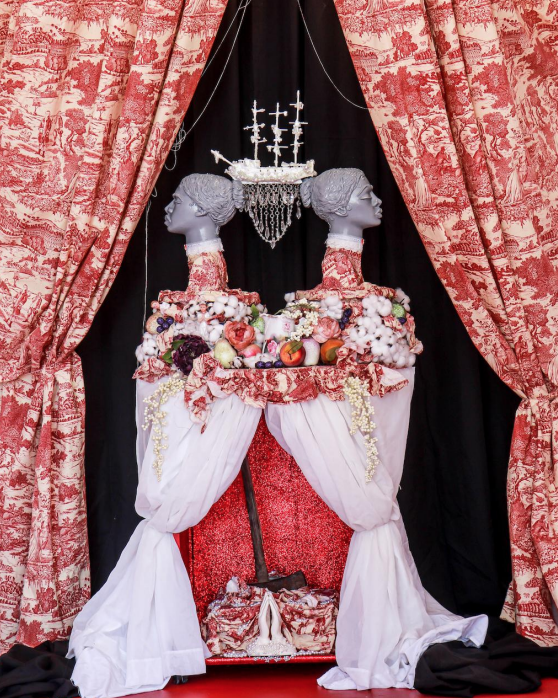
Lizz Denneau
June 7 – July 12, 2024
Opening Reception: June 7, 5-8pm
Sanitary Tortilla Factory is pleased to announce Lizz Denneau’s first solo exhibition in New Mexico. You’ve Made This House Your Home, is an evolving tableau exploring the nuanced intersections of respectability politics, White Supremacy, and capitalism. Inspired by W.E.B. Du Bois’ seminal essay ‘The Talented Tenth’ and fortified by hidden American narratives such as the story of Mary & Emily Edmonson, also known as The Pearl Incident, this installation delves into the depths of these societal dynamics.
Here, the metaphor of a house serves as a potent symbol for the structures that govern our lives, often without scrutiny of their origins. Borrowing from the real estate lexicon, I explore the concept of ‘bad bones,’ extending it to encompass the enduring societal frameworks inherited across generations and adapted to our present realities.
Within these walls, ornate assemblages and objects bear witness to the weight of perfection and respectability imposed on marginalized communities. Each installation is a living archive, retaining fragments of past iterations, thereby weaving a narrative tapestry of collective history.
Drawing on insights from scholars like E. Franklin Frazier, Sabrina Strings, and the literature of Margot Jefferson, the exhibition invites reflection on the dual role of these constructs in both advancing and dismantling communities. I invite you to join me on this journey of exploration and introspection as we navigate the complex terrain of societal structures and their impact on our shared humanity.
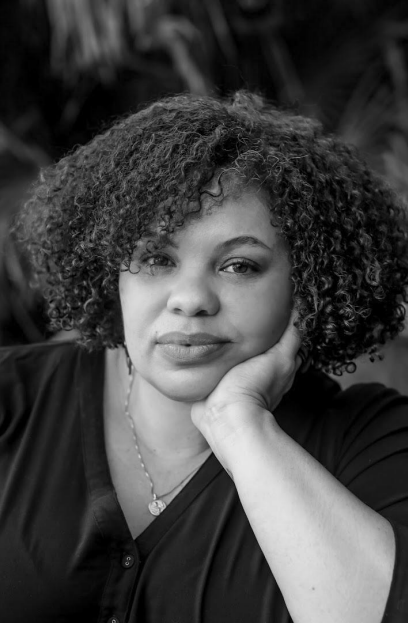
BIO: Elizabeth Denneau is an artist, writer, and art educator residing in the Sonoran Southwest. She obtained her teaching certificate and BFA in Art and Visual Culture Education through the University of Arizona and her MFA from the School of the Art Institute of Chicago. She is a member of the Art21 Educators Institute and currently teaches contemporary art and culture at Tucson High Magnet School while working with local community organizers and colleges to develop practical models of social justice in art education. In her personal artistic practice, she is continually influenced by narratives of human perseverance, vulnerability, and power dynamics. She writes about her experiences being a Black educator and her upbringing in a place where Black people represent less than 3% of the population. She is the co-founder of the Southwest Black Artists Collective and The Projects – art space. Both organizations serve a mission to bring visibility and support to Black creatives in the Southwest region.
Who Says You Can’t Go Home
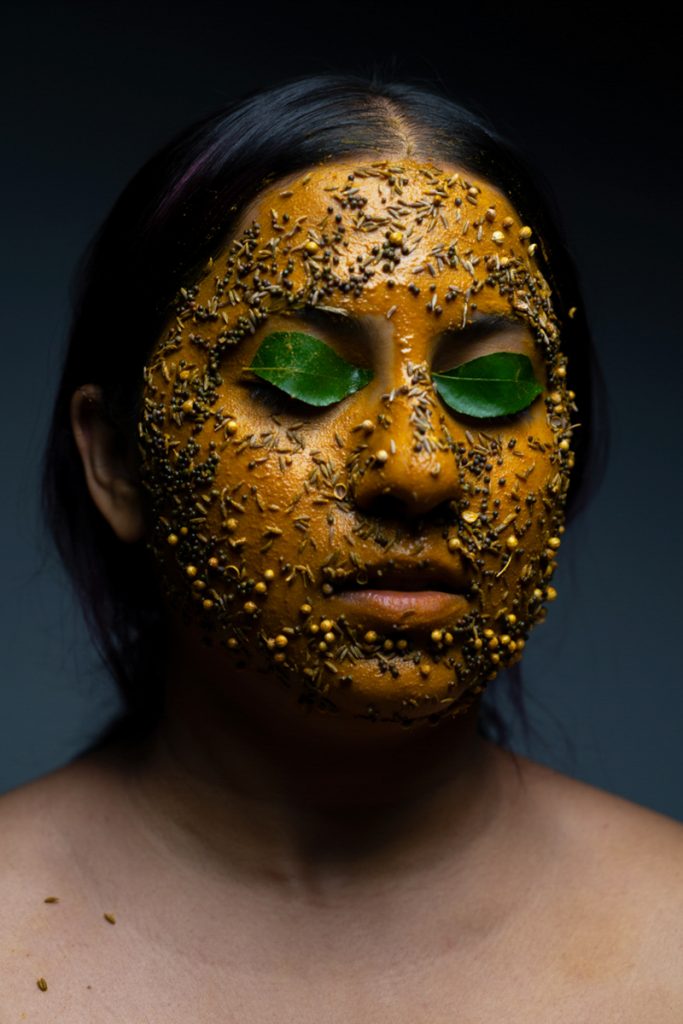
Yashoda Latkar
Exhibition: May 3 – 31, 2024
Opening Reception: Friday, May 3, 5-8 pm.
A Migrant’s Table Performance: Friday, May 3, 6pm
Sanitary Tortilla Factory is pleased to present Who Says You Can’t Go Home, an exhibition of new works by New Mexico State University’s College of Fine Art MFA Candidate and Sanitary Tortilla Factory’s 2024 Exceptional Visual Artist Scholar Yashoda Latkar. The exhibition, “Who Says You Can’t Go Home,” is a deeply personal and introspective journey into the complex interplay between migration, identity, and the quest for home. Through a diverse range of mediums, including photography, video, ceramics, and installation art, this body of work explores the notion of ‘home’ as both a tangible space and a psychological construct. Drawing upon her own experiences as an immigrant from Mumbai, India, to the United States, the exhibition delves into the persistent search for ‘home’ and the ever-evolving sense of Belonging.
The central theme of this exhibition revolves around the concept of ‘home’ and how it evolves through the process of migration and cultural displacement. As individuals, we often carry with us a deep-rooted connection to our places of origin. The exhibition investigates the multifaceted nature of ‘home,’ shifting from a physical space of shelter to a contested and ambivalent site in the face of displacement. Latkar’s creations in “Who Says You Can’t Go Home” are focused on the experience of living in an in-between space, belonging ‘nowhere,’ embracing the ambivalence even though the sense of being rooted, notions of a permanent home, and traditional routines are challenged.
Yashoda Latkar is the recipient of Sanitary Tortilla Factory’s 2024 Exceptional Visual Artist Scholar (EVAS) award. The EVAS series offers professional space for Master of Fine Art graduate students per year as their final thesis show. The culminating exhibition launches them into their profession as an artist. With the series, we underscore exceptional artists attending regional institutions while highlighting Albuquerque’s innovative connection to contemporary art practices.
Born and brought up in Mumbai, India, Latkar spent most of her life there and deeply identified with her home city, its bustling life, the vibrant street food culture, and the rich smells of spices. However, moving to New Mexico challenged every aspect of her identity. Nothing felt familiar, and suddenly, she found herself belonging nowhere. Her artistic narrative is rooted in this profound transformation, navigating between ‘there’ and ‘here,’ and building a new sense of self in a foreign land. As a migrant, the search for home is ongoing because one is constantly trying to make sense of their surrounding place. Latkar’s work is a mediation of these exact conscious efforts to belong and the desire to locate.
Opening night performance ‘A Migrant’s Table’ by Yashoda Latkar
In my creative practice, I explore the relationship between migration and identity, and my
constant search for home persists throughout my different bodies of work. I engage in the
fundamental question of where and what home is. In my work, I renegotiate the boundaries and
borders of ‘home’ by using self-portraitures, photographs of my family members and family
home, mixed media spiced-infused installations, and performative videos. My creations are
focused on the experience of living in an in-between space, belonging ‘nowhere,’ and embracing
the ambivalence even though the sense of being rooted, notions of a permanent home, and
traditional routines are challenged.
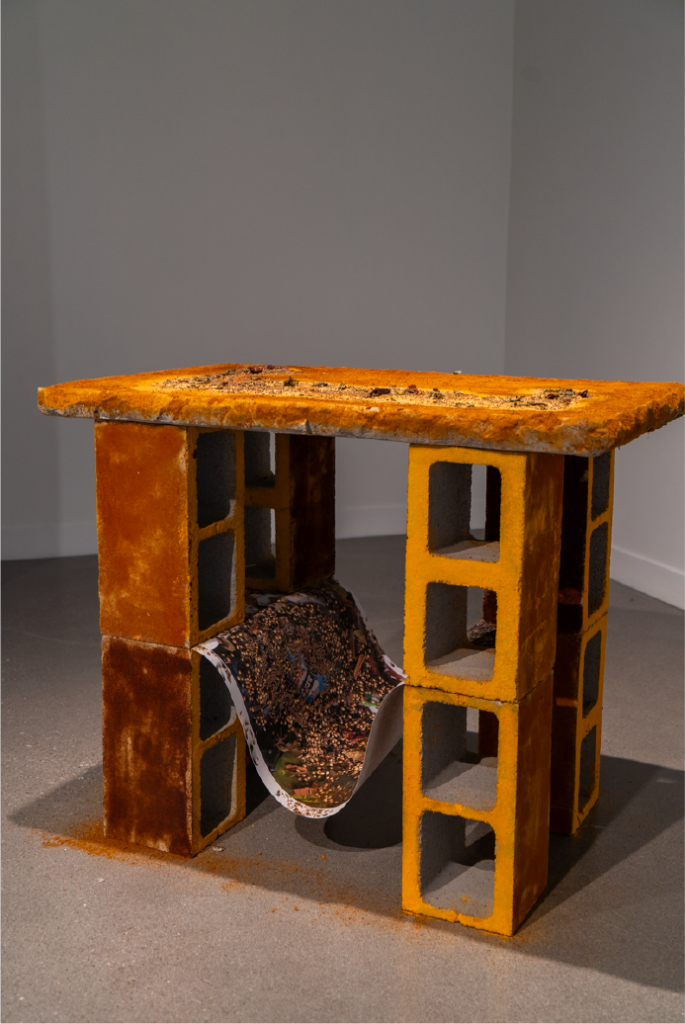
In my work “A Migrant’s Table” I create an installation using cinderblocks covered with
ground spices. Each side of the cinderblock is immersed in ground turmeric, cumin-coriander
seeds powder, and a special kind of mix of spices local to my community in India. The
cinderblocks are arranged in a shape of a table. As one enters the installation space, it is difficult
to escape the strong smell of spices. The aroma takes me back to my home in India, where it is
difficult to get away from the cooking smells. The walls of houses, the clothes, and even the
pores of one’s skin seep this smell.
As an immigrant, my sense of being and belonging are pulled in multiple directions
resulting in a state of flux. I (re)construct the fragments of my identity by using food,
predominantly spices in various forms. I move beyond the discussion of taste and investigate the
idea of experiencing food through multiple senses. My work includes multi-sensory cues of
visuals, sounds, textures, and smells that create a familiar home environment. Food, then,
transcends time and space.
